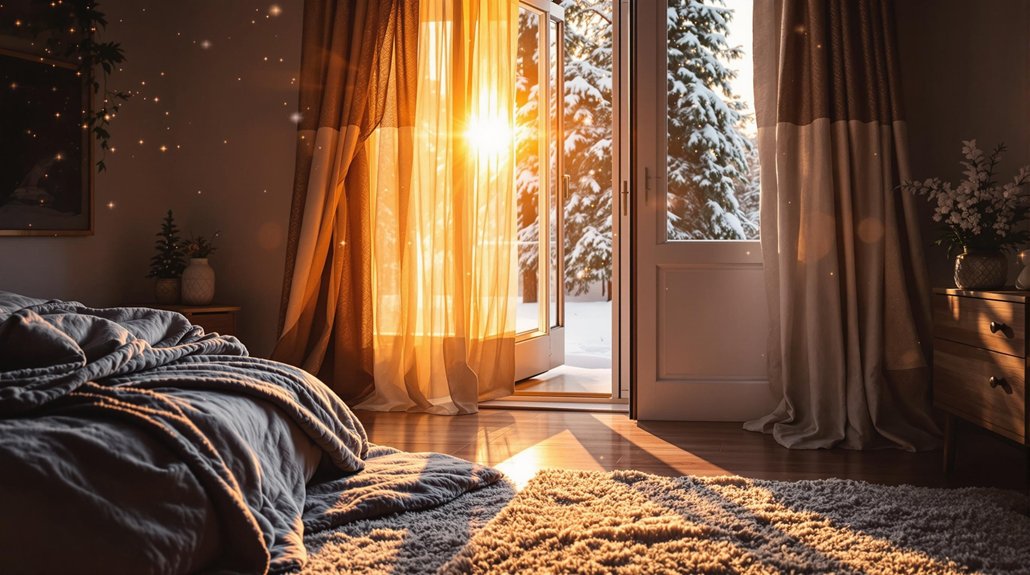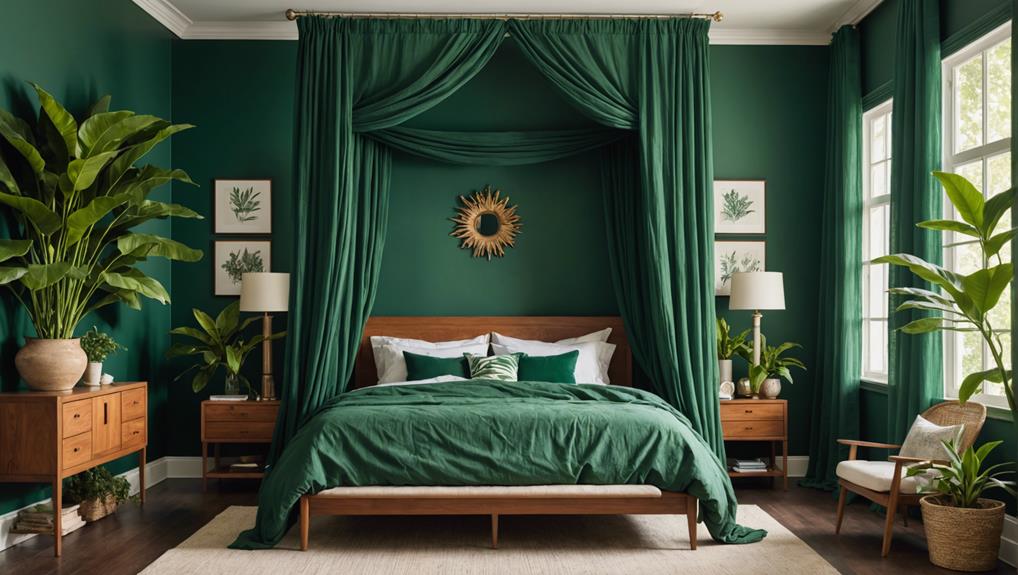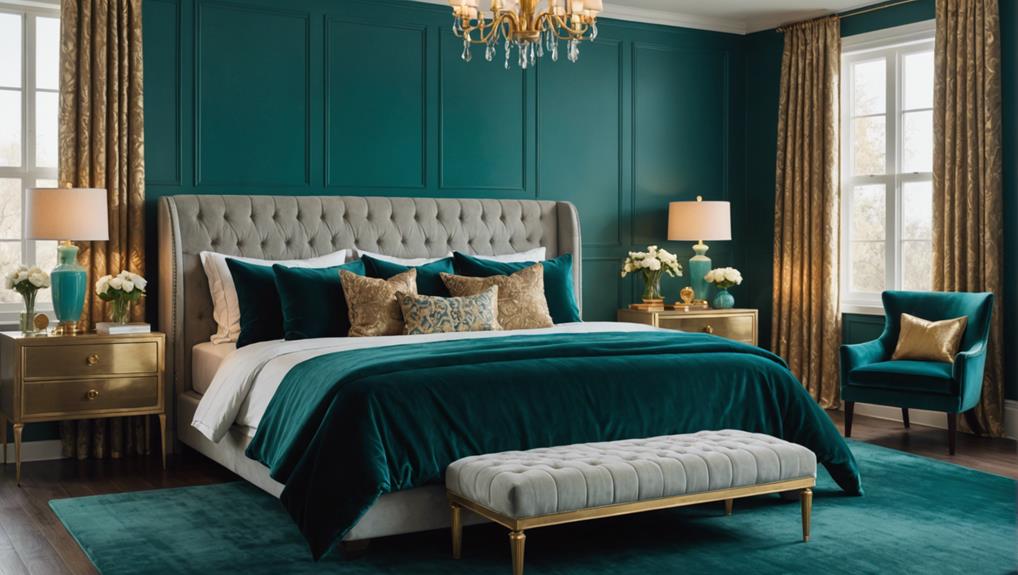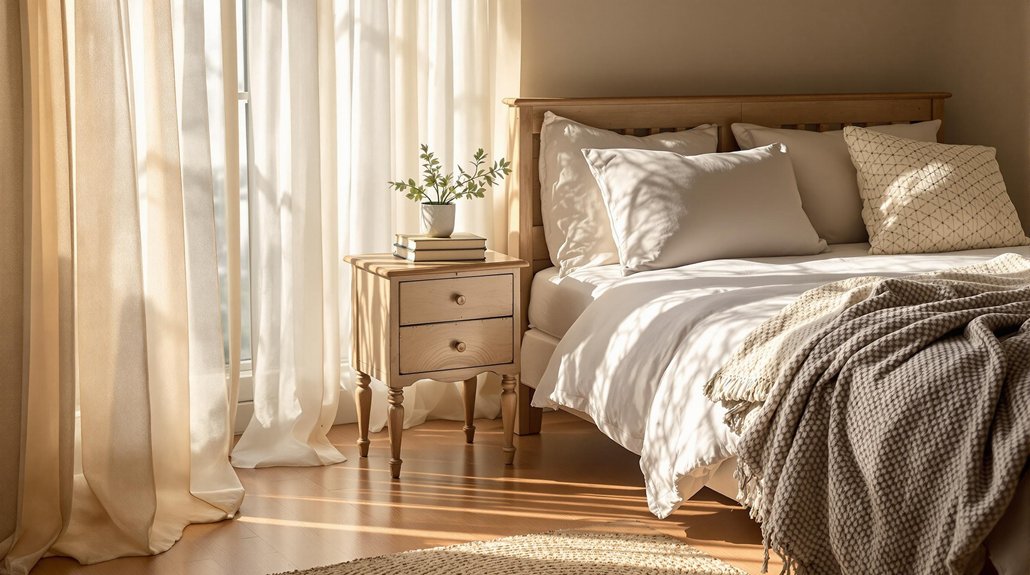
5 Tips for Better Bedroom Door Positioning: Open or Closed in Winter?
For ideal bedroom door positioning during winter, begin by ensuring proper alignment to enhance spatial design and minimise draughts. Closed doors considerably aid in heat retention, contributing to a warmer and more energy-efficient bedroom environment. Prioritise privacy by using solid core doors for superior soundproofing and warmth retention. Strategically allow for airflow by keeping doors slightly ajar at times, ensuring equalised temperatures throughout the space. Finally, balance feng shui principles by maintaining an uncluttered, harmonious design with thoughtful bed placement and minimised draughts. Discover the interplay of these elements and how they create a tranquil winter sanctuary.
Key Takeaways
- Close bedroom doors to retain warmth and improve energy efficiency during colder months.
- Ensure doors are properly aligned to enhance spatial design and prevent heat loss.
- Use solid core doors for better soundproofing and insulation.
- Slightly ajar doors can promote airflow and reduce humidity.
- Position doors to support Feng Shui principles and maintain tranquillity.
Assess Door Alignment
When considering the ideal alignment of bedroom doors, it is essential to understand the intricate balance between spatial design and energy flow. Proper door alignment not only contributes to an aesthetically pleasing bedroom but also plays a significant role in maintaining a harmonious environment.
A key aspect is the strategic positioning of the bedroom doors to enhance heat retention and minimise air draughts, especially during the colder months. Ensuring that the door does not align directly with a window is critical, as this setup can create draughts, compromising the room's warmth.
Moreover, evaluating door alignment involves ensuring that the door opens and closes smoothly. Regular maintenance of the door's functionality is important to prevent potential air draughts that could lead to significant heat loss, thereby impacting comfort levels.
Additionally, door positioning should allow visibility of the entrance while maintaining a comfortable distance from the bed. This arrangement fosters a sense of security and tranquillity, important for restful sleep.
Consider Privacy Requirements
Privacy needs are often paramount in bedroom design, influencing both the spatial layout and material choices. To maintain a sanctuary of tranquillity, closed doors play an essential role, especially during winter. They not only maintain privacy by preventing sound from wandering between rooms but also contribute to a serene sleeping atmosphere. Solid core doors are particularly effective at enhancing this privacy, offering superior soundproofing compared to their hollow-core counterparts. Such choices in door material and positioning reflect a keen attention to detail in creating an intimate, comfortable space.
Moreover, closed doors help maintain a comfortable temperature, necessary for a cosy retreat amidst the chill of winter. This guarantees that warmth is retained, further augmenting the sense of seclusion and peace within the bedroom. The alignment of spatial elements transcends mere aesthetics, influencing how individuals experience their personal environments.
Adding luxurious textures and comfort to the bedroom can further enhance the feeling of warmth and relaxation during winter months.
- Peace of Mind: Closed doors offer a soothing buffer from external noise.
- Soundproof Elegance: Solid core doors enhance the aesthetic appeal while safeguarding privacy.
- Comfort Cocoon: Maintain heat and comfort by minimising draughts.
- Security Sanctuary: A closed door fosters a safe, private haven.
- Well-being: Privacy is fundamental for mental relaxation and security.
In essence, the thoughtful arrangement of bedroom doors is critical in crafting a private, comfortable winter haven.
Optimise Heat Retention
In the quest for thermal efficiency, the strategic closure of interior doors emerges as a critical factor in optimising heat retention within a home. With approximately 35% of heat escaping through openings, ensuring doors are closed becomes paramount to maintaining warmth. This practice helps contain the heat generated within specific rooms, effectively trapping heat and reducing the circulation of cold air throughout the home.
By closing doors, the warmth is confined, allowing radiators to work more efficiently to help keep your home cosy and comfortable.
Solid core doors, with their superior insulating properties compared to hollow-core alternatives, further enhance this endeavour by minimising heat loss and maintaining a stable room temperature. This attention to detail in door selection and placement contributes not only to a pleasing aesthetic but also to functional spatial awareness, creating a sanctuary from winter's chill.
Focusing on selective heating in rooms that are frequently used guarantees that energy is used effectively, optimising heating costs and preventing unnecessary expenditure on unoccupied areas.
Enhance Air Circulation
Strategic airflow management within a bedroom can greatly enhance air circulation, ensuring a balanced and harmonious living space. Positioning doors slightly ajar can help equalise temperature between rooms and prevent the discomfort of a stuffy environment. This subtle adjustment allows for a graceful dance of air currents, promoting efficient airflow from heating systems and ensuring the retention of warmth where it is most needed. The interplay of open and closed doors is not just a matter of comfort but a delicate balance of maintaining beneficial humidity levels. By reducing the risk of mould growth, proper air circulation can transform winter's chill into a cosy sanctuary.
Here are some considerations to evoke a sense of well-being:
- Embrace subtle airflow by keeping doors slightly open to balance warmth and fresh air.
- Select solid core doors to help retain warmth, creating an inviting cocoon.
- Reduce humidity levels to protect your serene space from mould.
- Ensure unobstructed doors for seamless interaction with heating systems.
- Harmonise your environment by selectively closing doors to maintain warmth.
- Consider incorporating natural materials like wood and stone into your bedroom design to enhance the earthy and calming atmosphere.
Balance Feng Shui Principles
Harmonising spatial elements through Feng Shui in the bedroom can greatly enhance the room's energy flow and overall ambience. A pivotal aspect of this practice involves the strategic positioning of bedroom doors, particularly during the winter months. Keeping doors closed not only preserves warmth but also nurtures a sense of security, which is fundamental to maintaining a harmonious energy flow. This method acts as a barrier to external distractions, crafting a serene environment conducive to relaxation and improved sleep quality. Incorporating Feng Shui principles, the bed should be placed in a commanding position—visible from the door yet not directly aligned with it. This arrangement balances energy, mitigating feelings of vulnerability and fostering a tranquil atmosphere. Closed doors additionally aid in minimising draughts, thereby enhancing thermal comfort by reducing the entry of cold air. Furthermore, ensuring an uncluttered and organised space around the door is essential for facilitating smooth energy flow. This clear spatial arrangement not only supports Feng Shui principles but also contributes to a harmonious and inviting atmosphere. Integrating elements like dimmable LED lights allows for adjustable ambient lighting, further enhancing the room's tranquility and warmth. Essentially, mindful door positioning can greatly influence the bedroom's warmth, energy flow, and overall thermal comfort, creating a balanced and peaceful retreat.
Frequently Asked Questions
Is It Better to Keep Bedroom Doors Open or Closed in Winter?
To enhance winter insulation and energy efficiency, it is advisable to keep bedroom doors closed. This draught management strategy controls airflow, reduces noise, addresses privacy concerns, and optimises spatial warmth distribution, contributing to a comfortable and serene environment.
Should Bedroom Doors Be Open or Closed to Keep Cool?
Considering airflow management and temperature regulation, keeping bedroom doors open enhances circulation and cooling. However, privacy concerns, noise reduction, and personal preference may necessitate closed doors, balancing energy efficiency with spatial awareness and aesthetic considerations.
Is It Better to Sleep With Bedroom Door Open or Closed?
Determining if it's better to sleep with the bedroom door open or closed involves balancing sleep comfort, privacy concerns, and room temperature. Closed doors enhance noise reduction and safety, whilst open doors promote airflow management, affecting spatial ambience.
Which Way Should Bedroom Doors Open?
In determining bedroom door swing options, consider space utilisation, privacy concerns, and safety considerations. Inward-opening designs enhance privacy and air circulation, optimise space, and align with design aesthetics, while ensuring unobstructed pathways and efficient room layout for harmonious living.
Conclusion
In optimising bedroom door positioning during winter, several factors warrant consideration. Proper door alignment guarantees spatial harmony, enhancing environmental aesthetics. Privacy needs dictate the door's position, balancing seclusion with openness. Heat retention is maximised by closing doors, creating a cosy atmosphere, while open doors facilitate air circulation, maintaining freshness. Incorporating Feng Shui principles fosters an energetic flow, promoting overall well-being. Consequently, a nuanced approach, sensitive to spatial dynamics and environmental conditions, is essential for ideal bedroom door positioning.



Leave a Reply